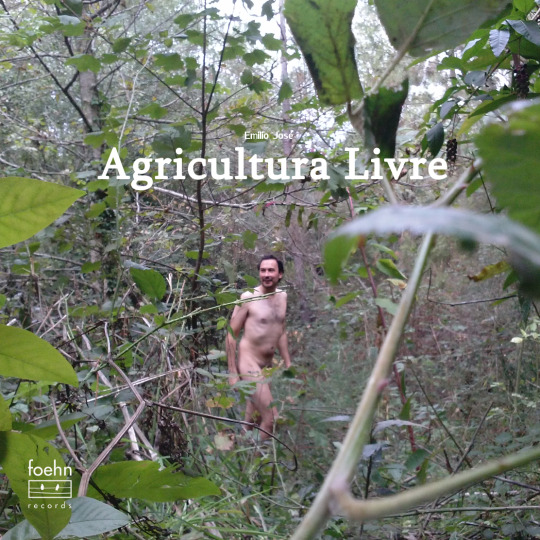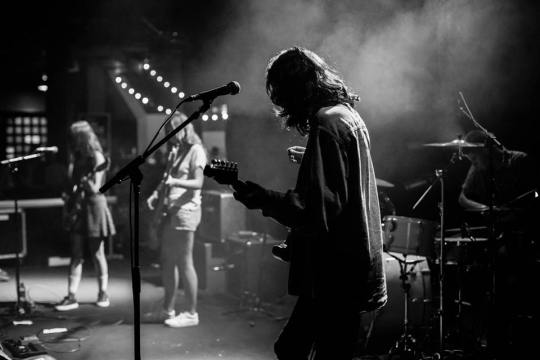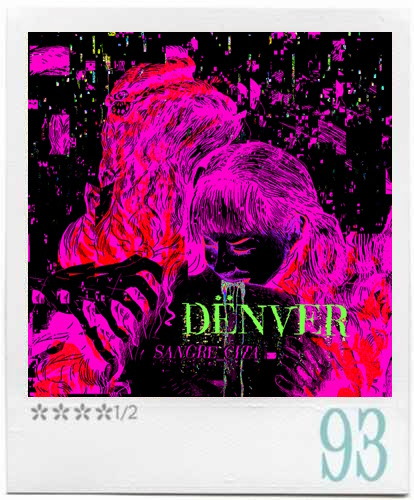Sangre Cita, DënverPrecordillera, ChileRating: 93by Zé GarciaPop chicloso is what Mariana Montenegro indicated in the days before the release of
Sangre Cita, as we were masticating through its second single, the ebullient “Mai Luv”. We were still processing first single “Los Vampiros” (On first listen: did I click on the wrong song? Is this even Dënver? What happened to Milton Mahan’s silvery vocals? Those inconsolable piano touches sound like Dënver but is Milton even on this track?), still contemplating its b-side, “Noche Profunda”. We could have been given “El Fondo Del Barro”, a track that had already been making the rounds on tour and would have allowed devotees to better assimilate Dënver’s transition from chamber obsession to Pop Stars. Dënver was excellent since
Música, Gramática, Gimnasia, larger than life since (should have been Club Fonograma Record of the Year in 2013, nothing against “La Trilla") “Revista de Gimnasia”, but Dënver in 2015 has been, if anything, abrasive.
Sangre Cita begins with the dreamlike R&B of "Noche Profunda”. Mariana is rhyming about being narcotized, consumed by bad premonitions, wanting to be silenced by kisses- she sounds like she's cooing. A raconteur pondering nighttime conspiracies, Milton’s vocals are transmuted cold, interrogating that which we yearn for, that which we conceal. The fact that Milton doesn’t sound like himself on most of
Sangre Cita, only adds to the mystique of an almost completely reformatted band. Among the catchiest and greatest works in the Dënver catalogue, “El Fondo Del Barro” has to be Dënver’s next single. It is prodigious, fervent, earnest-
disco house- a song for those of us living in the margins to feel our own eminence. “Mai Lov” is just as luminary, the perfect analgesic, full of endorphins. An obvious comparison points to J-Pop and its nominal leader, the fascinating Kyary Pamyu Pamyu, mixed with the
stultified PC Music crew, but lets not forget the nuanced eccentricities of
Otra Era compatriots, “La Joya” & “La Carretera”. The opening lines of “Bola Disco” function as the criterion of
not just
Sangre Cita’s hits, but also Dënver's greatest accomplishments:
"Puede que muramos en un baile / Que ese coro nos haga explotar ¡paf! ”
It sounds like traditional Dënver, a return to the
disco soft of “Los Bikers”. At first listen it feels like a misstep, especially in between titans "Mai Lov" and the epic, “La Última Canción”. But the dainty arrangements, the otherworldly electronic effects, its funky climax make “Bola Disco” a victor.
Mariana’s character development on
Sangre Cita is pretty impressive, another factor in the mystique of Dënver refurbished, adding to our mounting anticipation for her debut single as a solo artist under the potential pseudonym, Nausica. She seems more candid, vulnerable but astute. On “La Última Canción” she’s even moaning with desire, “Acércate a mí / Desvísteme”. She even has her lover drinking liquor from her ankles. Milton’s sexy confidence in the background, Mariana fully aware of her youth, flaunting it. Carly Rae Jepsen alongside superproducers Ariel Rechtshaid & Devonté Hynes tried their best at crafting a Dënver & succeeded in the should have been global hit “
All That”. Cinematographic coming of age nostalgia from 1980s teen flicks, a sweeping chorus, compelling synths, “La Última Canción” succeeds where “All That” couldn’t, namely in storytelling. Mariana is moaning again, masturbating to piano touches on the sparse “Pequeños Momentos de Satisfacción”. Sonically, it has much more in common with
Las Caras de La Muerte than anything else on
Sangre Cita so this isn’t sex appeal, this is about tears and those tiny moments that give us hope about our own agency. This is almost as personal as "Jesús, María, No Sé". Sunny verses that blur the line between adoration and adulation (much like this album review), a chorus that makes Milton sound like a boy band on an ominous dance floor, “Yo Para Ti No Soy Nadie” goes back and forth between a semblance of old Dënver and their current obsession with the nightlife. & we are definitely at the club on "Mi Derrota". Mariana is moaning again, this time like Shakira on "She Wolf” or Britney on "I'm A Slave 4 U". Unequivocally, this is
another era of Dënver.
Los adolescentes have grown up in “El Infierno” and this time they're going after the Establishment in true
BBHMM fashion. They are robbing banks, dodging $tate bullets, swirling in a noisy technicolor pop insurrection, and escaping by train. Bombastic hand clap verses, Milton singing from 1 to 6 (even the English only crowd can sing along), an escapist, j’accuse,
vox populi chorus, this one would fill a stadium. Who said our generational protest anthems had to exist within the realm of the legal? Or that pop hits aren’t subject to
détournement? In the Chilean political reality, don't doubt that “El Infierno" isn't mirroring lived lawlessness. From Chile’s
first ever bank robbery in 1925 by Buenaventura Durruti, countless bank expropriations during the U.$. installed dictatorship, to 2013 when 26 year old anarchist
Sebastián Oversluij was gunned down by BancoEstado security, to the
biggest robbery in Chilean history in 2014. Remember when Dënver stated they were more interested in making music for our parents generation? They finally accomplish this on "La Lava" with the help of Fanny Leona from 2015 Club Fonogrammy "Best New Artist” Nominee, Playa Gótica. We hear traces of Peter Gabriel & Kate Bush, Milton's voice altered to sound like Miguel Bosé. They sing about being impenetrable, surrounding themselves with contemplative maturity and graceful restraint- this is some of the most powerful sonic energy Dënver has ever crafted. Lyrically it is the most poetic song on the album, creating surreal imagery about washing one's hands with a lover's saliva, with a foam emanating from their lips. Is this the image conveyed in
that striking cover art? Fanny wistfully bemoans, "las ratas, la falta" then interjects "¡de una tecnología capaz de conservar la moral subversiva al paso del tiempo!" This song is about nourishing weary souls & energizing our magic. Against demons, against vampires...
Milton & Mariana enacting choreography fit for a girl/boy band from the early 2000s, a crucifixion inside a bathhouse pumping testosterone, unobtrusive and tasteful lasers, the visual treatment for "Los Vampiros" was everything. Attempting to dispel suspicions about accessorizing their aesthetic with Black bodies for the “Los Vampiros”
video, Dënver talked to me at length about their indebtedness to Black music, specifically Black music from the U.S.
Fuera de Campo was their homage to soul, disco, funk, Motown. At times
Sangre Cita continues that tribute (and expands into R&B with "Noche Profunda") albeit in a more plastic, less orchestral way. "Los Vampiros”, assisted wonderfully by (me llamo) Sebastian & Fanny Leona, will be remembered as one of the most jarring reintroductions in Iberopop band history, without a doubt Song of Summer 2015, and among the greatest records of the year. Where "La Lava" served as a protective spell, "Los Vampiros" works as a declaratory hex on the dance floor. Dënver has a history of epic closing numbers. "En Medio de Una Fiesta” adorned the melancholy of failure with cosmic phenomenon, whereas "Medio Loca (Hasta El Bikini Me Estorba)" pulsated tragedy & redemption in its final moments. “Sangrecita", the title track, announces itself like 80s heavy metal (King Diamond, anyone?)- the drums menacing- backed by a nonsecular choir. Instead of a brutal metal arena, we enter an esoteric cocktail party lavishing in disco rhythms, Milton singing through the sublime theatrics, sounding subdued, his vocals permuted beyond recognition. The entire affair is eerie, escapist, beautiful. The chorus features a few good friends in harmony, sounding universal, powerful. The final moments of
Sangre Cita- Pedropiedra on guitar- function as a response to our own Giovanni Guillen's question in reference:
who needs guitars anyway? And then those closing heartbeats, the vibrations of an album resplendent enough to elevate, heal, mesmerize.
In many ways, Dënver needed
Sangre Cita, a colossal maneuver designed to revamp Dënver as genuine Pop Stars capable of infecting and delighting masses, in their trademark beguiling sense of course. Dënver has accomplished and is destined for great things, among them bigger arenas. Milton joked in Chicago (I had the opportunity to hang & interview with Dënver in Chicago this year, a feat that didn't seem possible until it was) about their aspirations to hire full orchestras for every live show, like when Juan Gabriel sells out El Palacio de Bellas Artes in Mexico City.
Sangre Cita has already superseded
Música, Gramática, Gimnasia, but in due time it might even come to rival their previous masterpiece
Fuera de Campo. Love it or hate it- you can’t be blasé about this-
Sangre Cita leaves an indelible mark on our archives on a year with such few albums for the ages.






